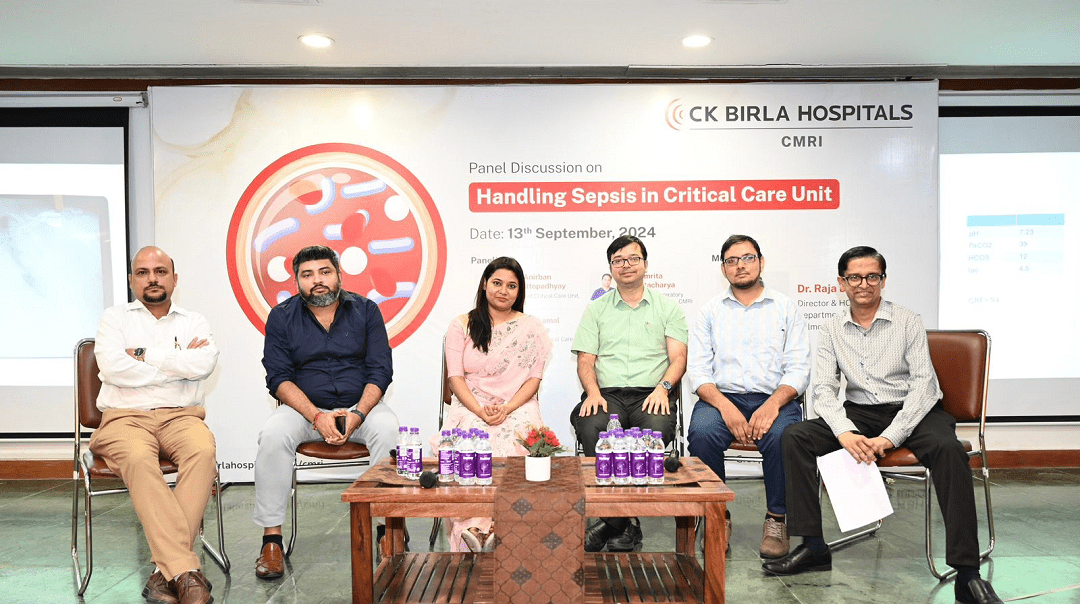Kolkata, September 13, 2024 – In recognition of World Sepsis Day, CMRI (Calcutta Medical Research Institute) spearheaded a groundbreaking initiative to increase awareness around sepsis, a life-threatening condition often overshadowed in the broader healthcare conversation. By hosting an expert panel discussion on ” Handling Sepsis in Critical Care Units” CMRI reinforced its position as a healthcare leader, aiming to save lives through education, innovation, and expert collaboration.
The event, designed to bridge gaps in both professional and public understanding of sepsis, brought together a prestigious panel of healthcare professionals, each with vast expertise in critical care and sepsis management. This unique initiative demonstrated CMRI’s unwavering commitment to fostering knowledge and providing best-in-class treatment for this elusive condition.
The panel featured:
* Dr. Anirban Chattopadhyay, Head of Critical Care Unit, CMRI
* Dr Amrita Bhattacharya, Incharge Respiratory Intensive Care Unit, CMRI
* Dr. Debkamal Mukherjee, Intensivist, Critical Care, CMRI
* Dr. Fahd Hossain, Intensivist, Critical Care, CMRI
Moderated by Dr. Raja Dhar, Director & HOD, Department of Pulmonology at CMRI, the discussion delved deep into critical sepsis topics, from early diagnosis and treatment protocols to overcoming common challenges in critical care settings. An esteemed audience of healthcare professionals attended, further validating CMRI’s role in advancing healthcare education.
“Sepsis continues to be one of the most critical, yet misunderstood, medical emergencies. By sharing our collective expertise, we aim to ensure better patient outcomes through timely intervention and treatment,” said Dr. Anirban Chattopadhyay, Head of Critical Care at CMRI. His sentiments echoed throughout the event, with a focus on knowledge sharing to save lives.
The Hidden Dangers of Sepsis: What You Need to Know
Sepsis occurs when the body’s response to infection spirals out of control, triggering widespread inflammation and often leading to organ failure or death if untreated. It’s a complex condition to diagnose because its symptoms — such as confusion, shallow breathing, or lightheadedness — can be easily mistaken for other illnesses. Time is of the essence in treating sepsis; rapid recognition and immediate intervention are crucial in preventing severe complications. Swift recognition and immediate intervention are critical in preventing severe complications, making awareness essential not only for medical professionals but also for the general public.
At CMRI, the expert team is equipped with cutting-edge technology to manage the most severe cases. From advanced diagnostic tools to intensive care units designed to support vital organs, CMRI is leading the charge in sepsis care with a multi-faceted approach that blends experience with innovation.
A Glimpse into the Panel’s Key Takeaways
Throughout the panel discussion, several important takeaways emerged:
* Early diagnosis saves lives: Rapid identification and treatment of sepsis significantly increase survival rates.
* Standardized protocols are crucial: A call was made for uniform treatment guidelines to avoid delays in sepsis management.
* Collaboration is key: CMRI encourages more hospitals and healthcare providers to collaborate, share data, and continuously improve strategies for managing sepsis.
Nursing staff were spotlighted as the unsung heroes in early sepsis detection, with their ability to notice subtle changes in patients’ conditions. The panel also stressed the importance of educating nurses and providing them with the tools and resources to act swiftly in life-threatening situations.
Dr. Amrita Bhattacharya, in charge of CMRI’s Respiratory Intensive Care Unit, emphasized the importance of public awareness: “Many people don’t realize how dangerous sepsis can be if left untreated. By spreading awareness and facilitating discussions like this one, we aim to bridge that knowledge gap and encourage proactive treatment.”
Addressing the Challenges: Public Awareness and Antibiotic Resistance
India faces significant challenges in managing sepsis, including delayed diagnosis and a growing problem of antibiotic resistance. During the panel, experts discussed the urgent need for responsible antibiotic use to prevent resistant infections that complicate sepsis treatment. Public awareness campaigns were also recommended to inform communities about the warning signs of sepsis and the importance of seeking medical help promptly.
CMRI’s state-of-the-art facilities, including its Respiratory Intensive Care Unit (RICO), are instrumental in providing world-class care. Combining medical expertise with cutting-edge technology, CMRI has built an ecosystem where sepsis patients receive top-tier treatment at every stage of their care journey.
CMRI: A Beacon of Healthcare Innovation
As CMRI marks over 50 years of excellence in healthcare, the institution remains committed to advancing medical science through education and collaboration. With over 250,000 surgeries, 5 million outpatients, and a robust international patient base, CMRI continues to lead by example, particularly in sepsis management.
This World Sepsis Day, CMRI not only highlighted the critical role of early diagnosis and intervention in sepsis care but also demonstrated its unwavering dedication to improving patient outcomes through continuous education, innovative treatments, and global collaboration.
About CMRI: Calcutta Medical Research Institute (CMRI) stands as a distinguished NABH-accredited multi-speciality hospital established in 1969 in Kolkata, entering its 54th year of service. CMRI is accredited by the National Development Board, Government of India, for DNB courses. The institute also houses a nurses’ training school recognized by the West Bengal Nursing Council. With 440 beds, CMRI is committed to delivering top-notch medical care to all segments of society. CMRI’s doctors have successfully performed over 250,000 surgeries, attended to over 5 million outpatients, and accommodated 500,000 inpatients. Notably, the facility has catered to the medical needs of more than 10,000 international patients. CMRI ensures cutting-edge care with its ITUs, ICUs, and neuro-ITUs, all supported by a highly qualified team of specialists. The hospital also runs a state-of-the-art Respiratory Intensive Care Unit which is as per international standards. It also runs transplant programs for both adults and the pediatric population.




